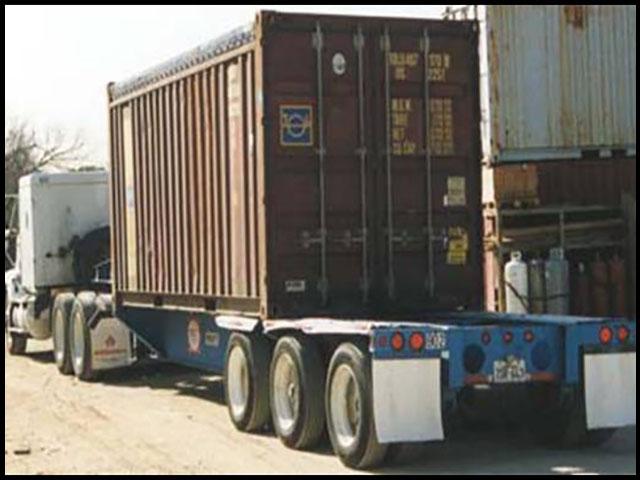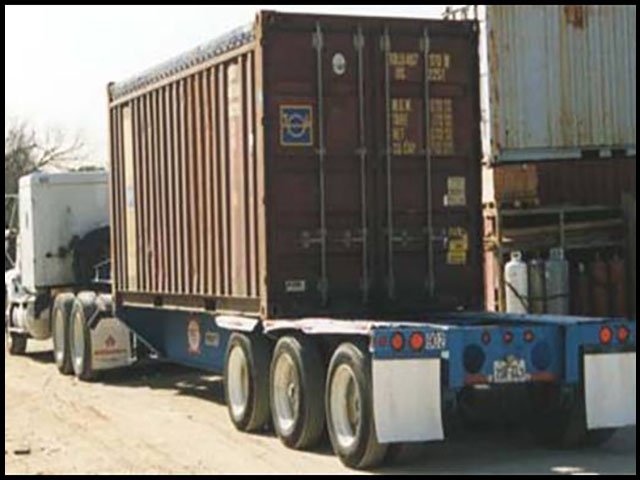Market Matters Blog
Agriculture Container Shippers Left Empty-Handed
Specialty Soya and Grains Alliance (SSGA) noted on their website on Oct. 23 that shipments of agricultural products by containers are being discontinued by a major shipping line, effective immediately and for the foreseeable future. The German international shipping and transportation company Hapag-Lloyd dropped a "bombshell," said SSGA, informing exporters that it is suspending overseas ag container shipments from North America, a decision that could cause major hardships within the entire U.S. ag community.
SSGA reported that the export suspension is being driven by the need for ocean carriers to get their containers back to Asian manufacturing centers as quickly as possible to handle burgeoning, higher value imports coming to the U.S. "High demand for imported consumer goods has driven import container shipping prices to their highest level, to the extent that some carriers apparently are willing to send empty containers immediately back to Asia for faster turnaround. The container flow imbalances in demand and costs, which underlie the challenges ocean carriers face in getting containers in position in Asia, have also been among key developments affecting the ag export supply chain," said SSGA.
"Hapag-Lloyd has been one of the most reliable and dependable carriers for rural, inland ag shippers, so this announcement is devastating and shocking," said Bob Sinner, president of North Dakota-based SB&B Foods and chair of SSGA's competitive shipping action team. "For those of us in the food soybean arena, we are just coming off a harvest that our overseas food manufacturing customers are anxious and desperate to begin receiving."
Sinner noted that this move disrupts the food supply chain, as consumption of soy foods has been strong throughout the COVID-19 pandemic and that worldwide food inventories are low. "Companies in those countries rely on us for their food manufacturing. We've got our new crop harvested and we're making significant and consistent bookings with carriers to get our products shipped quickly and as soon as possible," said Sinner.
In a recent Journal of Commerce article, Sinner said that "Hapag-Lloyd over the years has been better than many carriers in dedicating assets to exporters in the U.S. interior, so the line's suspension of agricultural export bookings will be missed. Farmers understand the economics of the shipping industry and how the container shortage is affecting carriers' global operations, but they also hope that carriers attempt to understand the shipping and equipment needs of U.S. farmers."
P[L1] D[0x0] M[300x250] OOP[F] ADUNIT[] T[]
WILL CANADA'S CONTAINER SHIPPERS BE AFFECTED?
Quorum Corporation, the agency tasked by the Canadian government to monitor grain shipping data, showed in their 2018-19 annual report that the fastest growth in shipping by containers over a three-year period is seen in cereals and oilseeds -- primarily wheat and canola -- where shipments accounted for 37.1% of 2018-19 container movement, which compares to the 62.9% of the volume made up from the shipping of pulses and special crops.
DTN Canadian Grains Analyst, Cliff Jamieson, said that, so far in 2020, "The current calendar year has posed a challenge for the Canadian industry when it comes to container shipping, linked to the global COVID-19 outbreak. The global pandemic resulted in a sharp drop in North American demand for Chinese goods, which had significant consequences for global transportation.
"By mid-March, media was reporting 33 canceled container ships or blank sailings from Asian destinations into the Port of Vancouver. This led to reduced backhaul shipping opportunities for agricultural goods, backed up containers in transloading yards and a reduced supply of new containers for loading. This came at a time when global pandemic-buying led to increased demand for many crops."
While this situation was viewed as returning to normal in the summer months, the Port of Vancouver midyear statistics show the container volumes hit hard, said Jamieson. "The import quantity of containers is reported down 4% from the previous year to 824,180 TEUs (20-Foot Equivalent Unit) and the export quantity fell by 11.6% to 740,298 TEUs for all goods and commodities."
As for the Hapag-Lloyd announcement suspending the shipping of agricultural commodities to Asia, Jamieson noted that, according to the Western Producer, the $1,000 CAD/container backhaul rate can easily be recouped by Chinese shippers that will gladly pay premiums for shipping their goods out of the country.
"To date, there have been no clear signals of the suspension move affecting markets in Canada, although it is early in the crop year," said Jamieson. "With approximately 30% of the pulses shipped by container, these should be by first markets to signal concern, although dry pea and lentil prices continue to push higher. Shipping of bulk pulses is also seen increasing year over year, perhaps taking up the slack. Over the first 13 weeks of the crop year, the percentage of dried peas exported through licensed facilities is up 30.9% from last year and bulk shipping of lentils is up 86.9%."
Jamieson added that, "Opportunities for shipping agricultural commodities by container will continue to increase in the future as ports continue to increase their capabilities. An expansion project has just been completed at the Port of Halifax, while projects remain proposed or underway in the ports of Montreal, Thunder Bay, Vancouver and Prince Rupert."
Mary Kennedy can be reached at mary.kennedy@dtn.com
Follow her on Twitter @MaryCKenn
(c) Copyright 2020 DTN, LLC. All rights reserved.






Comments
To comment, please Log In or Join our Community .